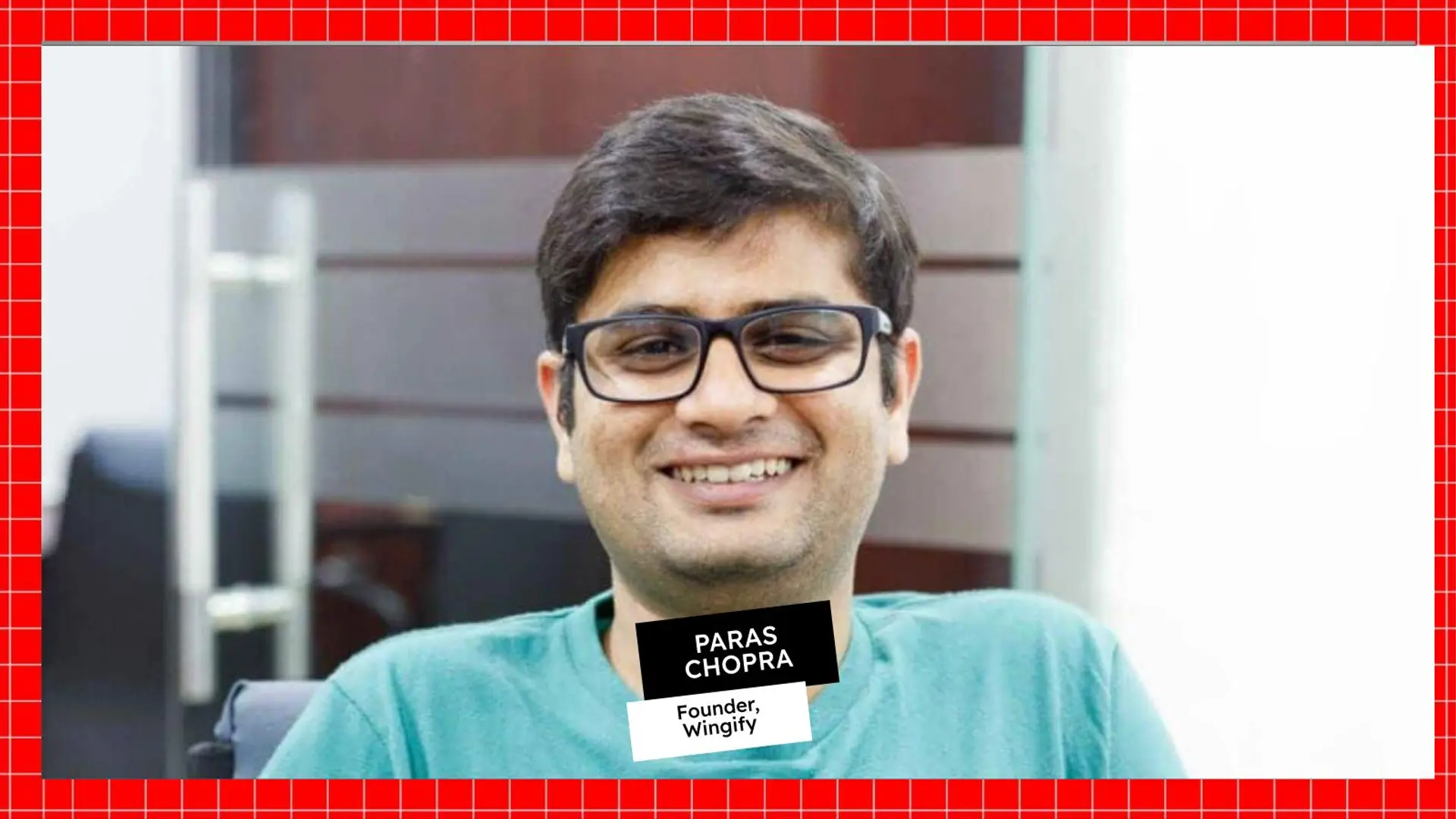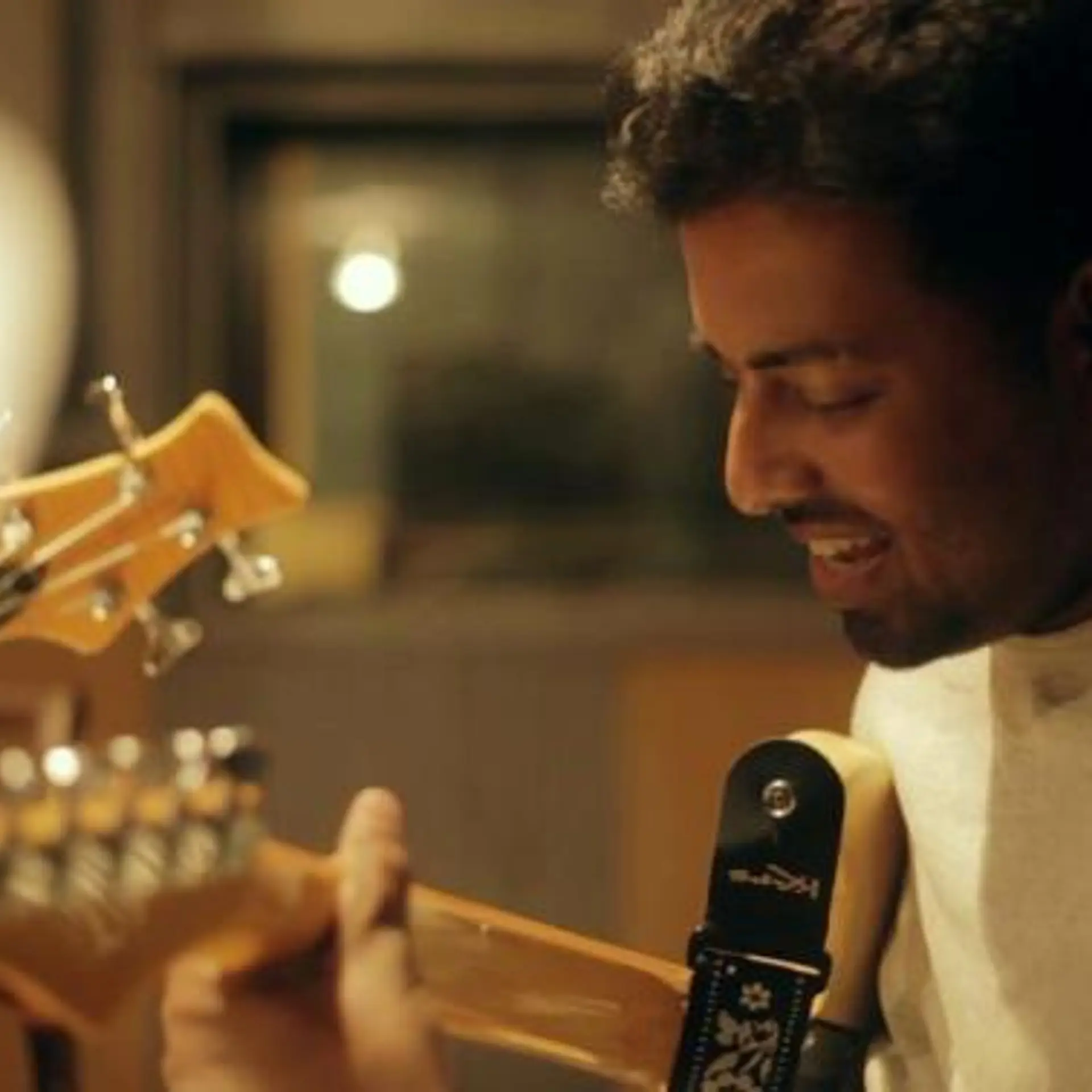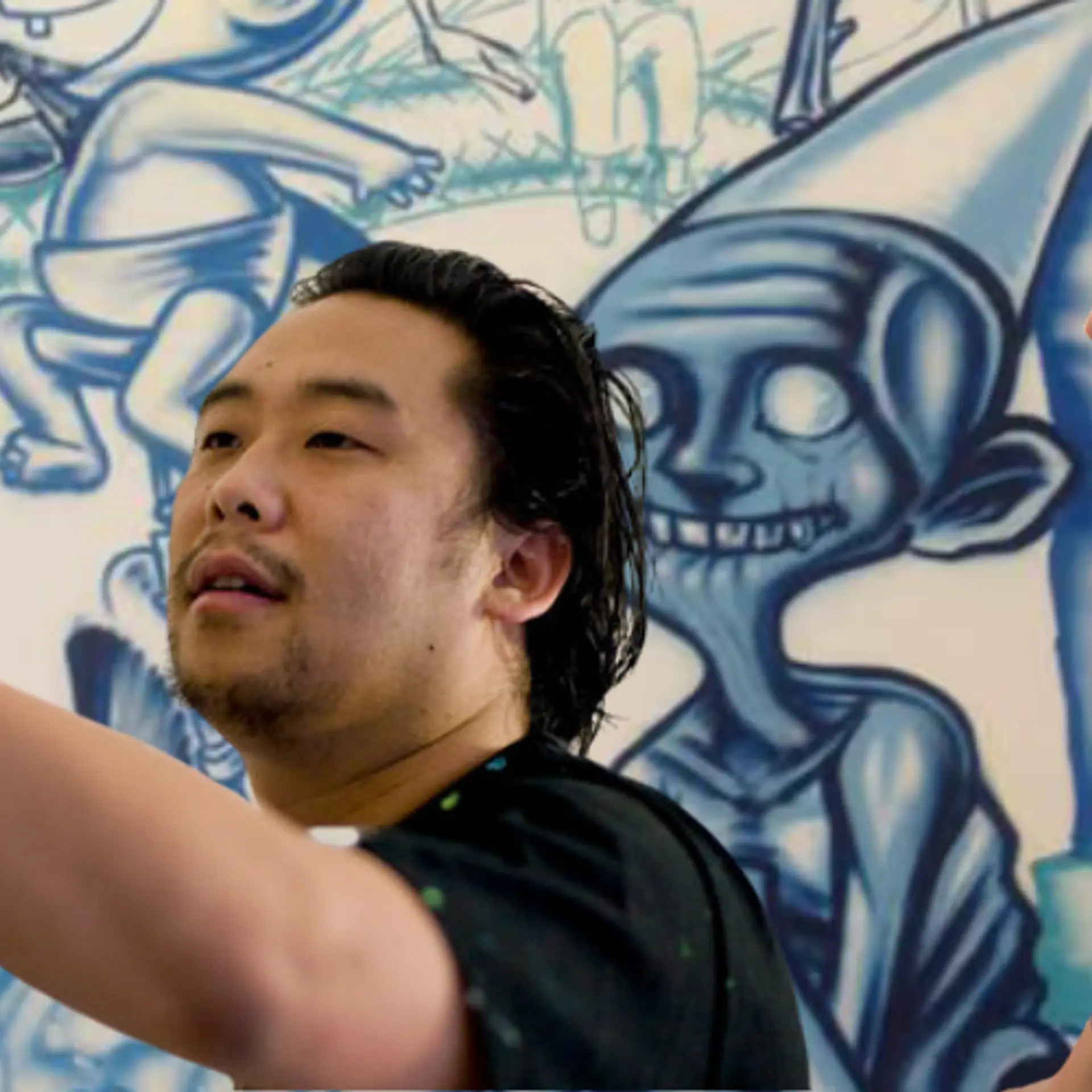How Aagaaz is using theatre as an instrument of social change in Delhi’s slums
Using theatre as a medium, this young artist from Delhi is creating inclusive spaces for learning, critical thought, and dialogue among underprivileged children. Sanyukta Saha has been teaching theatre to the kids of Nizamuddin basti for the past eight years.
Theatre arts, which is often thought of as a privileged affair is now being brought to underprivileged kids in fringe settlements of Delhi/ NCR. It is being used not just as a method to provoke responses and critical thought but as a language that initiates a positive change in their lives. The team at Aagaaz Theatre Trust is using applied theatre as a medium to bring about a change in the lives of children.
New beginnings
SanyuktaSaha, began to work with children from Nizamuddin Basti during her time at the Aga Khan Foundation in 2007. Sheinitially worked as an Arts Education Program Co-ordinator, and later, also as facilitator for the Theatre and Visual Arts Programme at the foundation.
“I started running a theatre programme of my own at the time, and then quit working and continued doing theatre with the group of children in the Basti. The group grew as the work went on and in 2015, we registered ourselves as Aagaaz Theatre Trust,” says Sanyukta, the founder of Aagaaz.
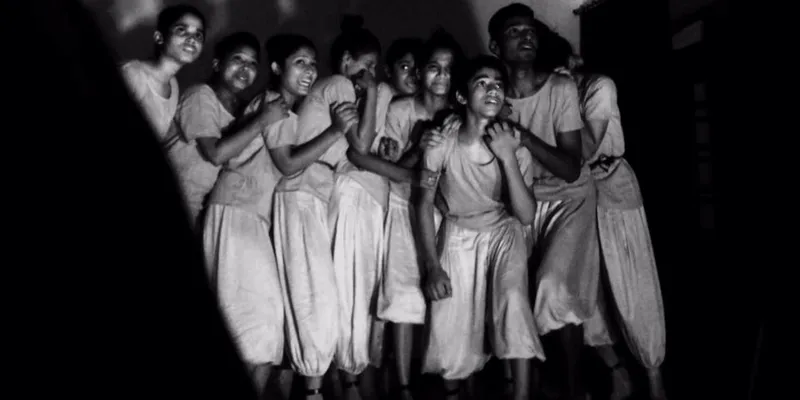
Aagaaz is registered as an independent community arts organisation under the Trusts Act. Aagaaz performs plays with stories that raise questions and create dialogue amongst diverse audiences. At its core are the 20 adolescents from HazratNizamuddinBasti who are growing into arts practitioners, theatre makers, and facilitators.
Aagaaz is the Urdu word for new beginnings. We are developing as a space which is trying to question the dynamics of who teaches who and who gives knowledge. We are trying to diverge from the structured methods of learning to find new and more engaging methods, which are learner-centric, she says.
The Unlearning Uncentred
Sanyukta talks about ‘The Unlearning Uncentred’ workshop that started after receiving a grant from Khoj International Artists’ Studio. The workshop focuses both on children and adults from the community. The children belong to the community of tongewallahs that reside on the fringes of Khirki.
Tongewallahs are men who drive tongas during weddings and form part of the music bands during wedding processions.
The workshop aims to nurture curiosity and is focused on different ways of learning through active engagement, conversations, and play. It aims at breaking the rigid, conventional way of thinking and restructuring the thought process among children. Children from NizamuddinBasti are a part of this programme and the core group works as volunteers for it.
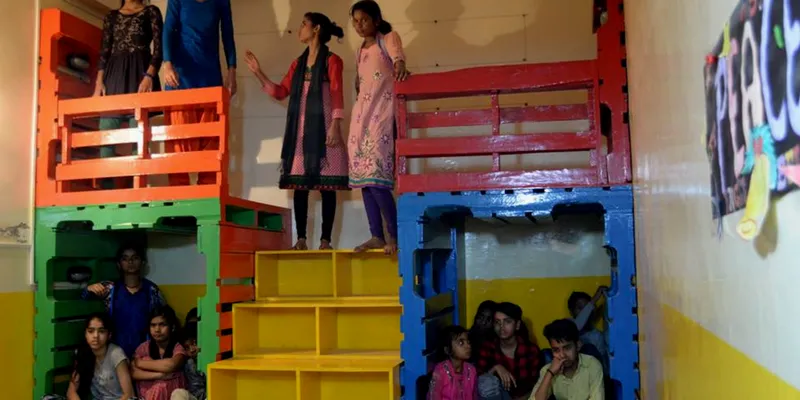
Toys made from trash, books read aloud in front of an audience, children deciding the agenda of the workshop, are some unconventional methods used here.
The core group has been put on a three-year intensive theatre programme with well-known theatre artists in order to give them a deeper understanding of the field. Each child also has a mentor, under the ‘MentorOne’ programme of the organisation. The aim is to have at least one person in their life whom they can approach and share anything with. The mentor is allotted on the basis of the interest of the child and come from varying fields like research, finance, music etc.
Applied Theatre
“We initially decided to develop a theatre in education repertory, where actors would be playing the role of both performers and educators. However, in the last couple of years, the nature of our work has changed. It’s no longer just about theatre and education, but is really becoming a space for learning, critical dialogue and thought, all of them anchored at some level to the arts,” says Sanyukta.
The core group is primarily involved in theatre production, and the plays are staged at schools, public spaces, colleges, and festivals.
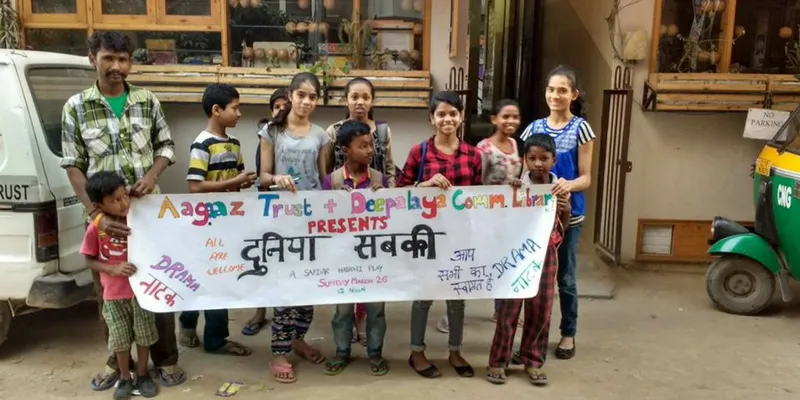
Aagaaz’s first major production was Duniya Sab Ki, inspired by Safdar Hashmi’s poem of the same name, which deals with issues of entitlement. The play asks questions that are intensely relevant to the current scenario. Who does the world belong to? Who should the world belong to? Relived through personal experiences, this piece has been created to provoke answers to these questions.
We are using the play as the base for different workshops that we conduct, and beginning conversations along the lines what the play has to say, says Sanyukta.
Last year, Aagaaz was selected as a Changeloomer for a six-month programme called Changelooms run by Pravah, a Delhi based NGO working to impact issues of social justice through youth citizenship action.
Read More:
100 Story House, a library for children with a hope of better future for Meghalaya
An artist nurturing a dying art and his quest for its conservation
Moving forward
To fund the initiatives, Aagaaz has set up ‘Friends of Aagaaz,’ which essentially seeks small amounts from well-wishers and supporters. To be a part of this community,one can pledge a sum of Rs. 10,000 annually for three years.While the team does accept donations more than the this amount, they insist donors should engage work Aagaaz’swork, by visiting the children and volunteering with the organisation.
Aagaaz has also started working in bastis in Dwaraka and Jaipur -on sexual and reproductive health, gender, relationship, sexuality,and has grown organically since last year. The team is trying to take this initiative to other places, along with developing a module for schools in and around Delhi.
Over the years, not only has the number of members, kids and young adults of all ages from the Nizamuddin Basti, grown, but so has the number of volunteers, interns and support staff. As more people come on board, each one brings a new opportunity and direction. Now, Aagaaz also runs a one-on-one mentorship programme, says Sanyukta.
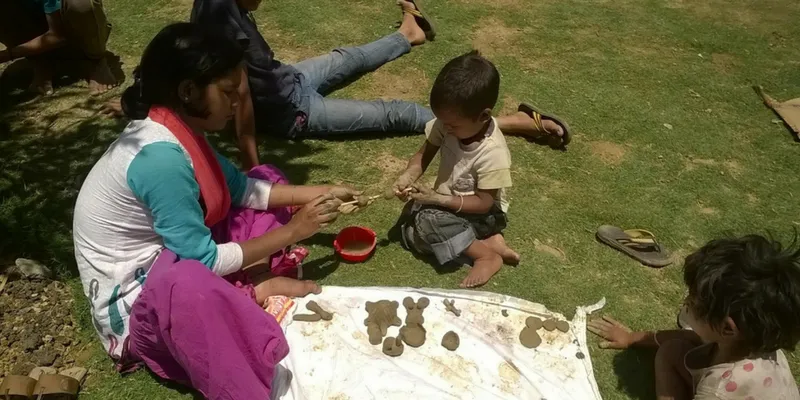
“We hope to one day expand our work to other parts of the country. But as of now, we want to concentrate our energies on Delhi and surrounding areas. We are more than happy to share what we do/how we do/resources/know-how/expertise with people from other parts of the country/South Asia/the world who are looking to set up similar organisations.”
Agaaz has so far worked with over 200 children, and has hadhad an impact on the lives of more than 2500 plus people.
Enter the SocialStory Photography contest and show us how people are changing the world! Win prize money worth Rs 1 lakh and more. Click here for details!



